
Super Mario Kart is a kart racing game developed and published by Nintendo for the Super Nintendo Entertainment System (SNES). The first game in the Mario Kart series, it was released in Japan and North America in 1992, and in Europe the following year in 1993. Selling 8.76 million copies worldwide, the game went on to become the fourth best-selling SNES game of all time. Super Mario Kart was re-released on the Wii's Virtual Console in 2009, on the Wii U's Virtual Console in 2013, and on the New Nintendo 3DS's Virtual Console in 2016. Nintendo re-released Super Mario Kart in 2017 as part of the company's Super NES Classic Edition.

The Master System is an 8-bit third-generation home video game console manufactured and developed by Sega. It was originally a remodeled export version of the Sega Mark III, the third iteration of the SG-1000 series of consoles, which was released in Japan in 1985 with graphical capabilities improved over its predecessors. The Master System launched in North America in 1986, followed by Europe in 1987, and then in Brazil and Korea in 1989. A Japanese version of the Master System was also launched in 1987, which features a few enhancements over the export models : a built-in FM audio chip, a rapid-fire switch, and a dedicated port for the 3D glasses. The Master System II, a cheaper model, was released in 1990 in North America, Australasia and Europe.
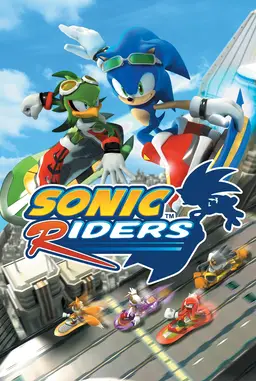
Sonic Riders is a racing video game for the GameCube, PlayStation 2, and Xbox in which the player controls characters from the Sonic the Hedgehog series on hoverboards. In the game's 16 tracks, the player competes against characters—either controlled by computers or other players—in story and battle modes. It was developed by Sonic Team and Now Production, published by Sega, and released in February 2006 in Japan and North America. It was released in Europe the following month and for Windows at the end of the year. A Game Boy Advance version developed by Backbone Entertainment was canceled.
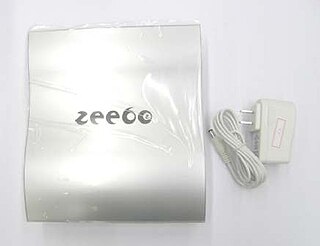
The Zeebo is a 3G-enabled entertainment and education system from Zeebo Inc. It enabled users to play video games, and also connect to the Internet, communicate online and run educational applications. The Zeebo was targeted at developing markets such as Brazil and Mexico. Zeebo Inc. described the Zeebo as bringing "the fun and excitement of interactive entertainment and education to those who—until now—have had little or no access to such technology."
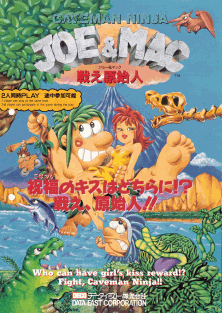
Joe & Mac, also known as Caveman Ninja and Caveman Ninja: Joe & Mac, is a run and gun platform game released as an arcade video game by Data East in 1991. It was adapted for the Super NES, Mega Drive/Genesis, Nintendo Entertainment System, Game Boy, Amiga, Zeebo, Nintendo Switch, and IBM PC compatibles.
Tec Toy S.A., trading as Tectoy since late 2007, is a Brazilian toy and electronics company headquartered in São Paulo. It is best known for producing, publishing, and distributing Sega consoles and video games in Brazil. The company was founded by Daniel Dazcal, Leo Kryss, and Abe Kryss in 1987 because Dazcal saw an opportunity to develop a market for electronic toys and video games, product categories that competitors did not sell in Brazil at the time. The company stock is traded on the Bovespa.

Need for Speed: Carbon is a 2006 racing video game and the tenth installment in the Need for Speed series. Developed by EA Black Box, Rovio Mobile and published by Electronic Arts, it was released on October 31, 2006, for the PlayStation 2, PlayStation 3, Xbox, Xbox 360, GameCube, Windows, and Mac OS X, and on November 19, 2006 as a launch title for the Wii and in 2008 for arcade cabinets. A portable version, Need for Speed: Carbon – Own the City, was released for the PlayStation Portable, Game Boy Advance, Nintendo DS. and Zeebo, While it featured similar gameplay to the console version, the portable versions included new or modified gameplay elements, a different setting and storyline, and a different selection of teammates.

Alpine Racer is a racing sports video game developed and published by Namco for arcades. It had a limited release in December 1994, followed by a wide release in July 1995. It ran on the Namco System 22 arcade hardware.

Ayrton Senna's Super Monaco GP II is an arcade-style Formula One racing video game developed and manufactured by Sega for the Sega Genesis and Mega Drive, Master System, and the Game Gear in 1992. It is a follow-up to Super Monaco GP. The game was also endorsed by, and had technical input from, the then-Formula One champion Ayrton Senna. Gameplay includes a World Championship season featuring recreations of the tracks in the 1991 Formula One World Championship, along with a three-race "Senna GP" mode set on fictional tracks.

Hot Wheels: Extreme Racing is a racing game for the PlayStation, released in 2001. It features vehicles based on the Hot Wheels series of toys.

Peggle is a casual puzzle video game developed by PopCap Games. Initially released for Microsoft Windows and Mac OS X systems in 2007, it has since had versions released for Xbox Live Arcade, PlayStation Network, the Nintendo DS, Windows Mobile, iOS, Zeebo, and Android; the game has also been ported as a Java application, and an extended minigame incorporated into the massively multiplayer online game World of Warcraft. A sequel was released in September 2008, titled Peggle Nights. PopCap, a subsidiary of Electronic Arts, announced Peggle 2 at E3 2013.

Mario Kart Wii is a 2008 kart racing game developed and published by Nintendo for the Wii. It is the sixth installment in the Mario Kart series, and was released in April 2008. Like its previous installments, Mario Kart Wii incorporates playable characters from the Mario series, who participate in races on 32 different race tracks using specialized items to hinder opponents or gain advantages. The game features multiple single-player and multiplayer game modes including two- to four-person split screen. Online multiplayer was supported until the discontinuation of Nintendo Wi-Fi Connection in May 2014. Mario Kart Wii uses the Wii Remote's motion-controls to provide intuitive and conventional steering controls. Each copy of the game was bundled with the Wii Wheel accessory to augment this feature and mimic a steering wheel.
G-Mode Corporation is a Japanese company that specializes in games for Java-compatible mobile phones. The company also licenses content for mobile telecommunications operators, as well as being involved in the original equipment manufacturing of mobile phone games.
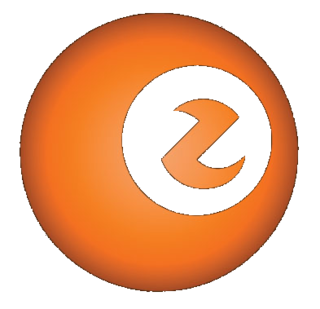
Zeebo Inc. was an American consumer electronics company and creator of the Zeebo entertainment and education system. Designed for "emerging markets" in countries such as Brazil, Mexico, India and China, the Zeebo system runs videogames and other interactive content delivered via wireless 3G digital distribution. This approach is intended to thwart piracy and reduce the cost of content. The system also enables wireless Internet access for web browsing, email and social networking. The Zeebo was sold throughout Brazil and Mexico, and the company has discussed the possibility of future product introductions elsewhere in Latin America, in India, China and Russia.

Crash Bandicoot Nitro Kart 3D is a 2008 racing video game developed by Polarbit and published by Vivendi Games Mobile for iOS, N-Gage service, and Zeebo. The game is the fifteenth installment in the Crash Bandicoot video game series, and was released on the App Store in Europe on June 9, 2008 and in North America on July 9, 2008. The game's story centers on a racing tournament held by antagonists Nitros Oxide, Doctor Neo Cortex and Ripper Roo in an attempt to banish the titular character, Crash Bandicoot, and his friends from their island home. The game was followed by a sequel, Crash Bandicoot Nitro Kart 2, in 2010.
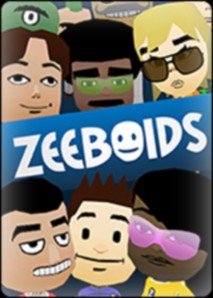
Zeeboids is an avatar creation application developed by Zeebo Interactive Studios in Brazil and released exclusively for the Zeebo system. Zeeboids is compatible with Zeebo Football Club (F.C.) games such as Zeebo F.C. Foot Camp, enabling players to create custom characters ("avatars") and participate in online rankings.
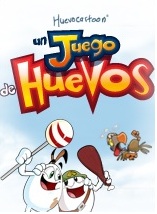
Un Juego de Huevos is a 2D platform videogame, created exclusively for the Zeebo system by Swedish studio Fabrication Games. It is the first videogame based on Una Película de Huevos, the hit movie from the Mexican animation company Huevocartoon. The game was released on April 19, 2010, in Mexico. A version with Portuguese text was released in Brazil in August, 2010, under the title Um Jogo de Ovos.
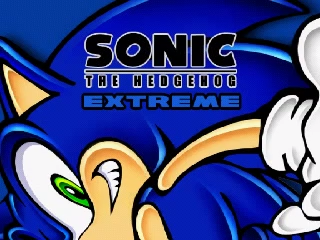
Sonic Extreme was a prototype video game created by Vision Scape Interactive in May 2003. Proposed as a spin-off to Sega's Sonic the Hedgehog series, Sonic Extreme featured Sonic and Shadow riding hoverboards in a Green Hill Zone-themed open world, with gameplay likened to Tony Hawk's Pro Skater. It featured three gameplay modes, which included searching for keys and Chaos Emeralds and fighting or racing another player. Vision Scape created the prototype while it made cutscenes for Sonic Heroes (2003); it was developed on the Xbox with intent to port it to the GameCube and PlayStation 2. The prototype was assembled using the RenderWare game engine and assets from prior Vision Scape and Sonic games.
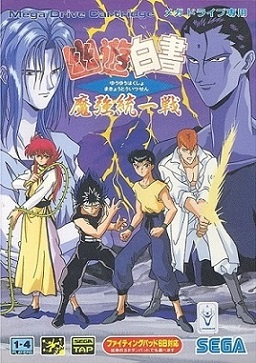
Yu Yu Hakusho Makyō Tōitsusen is a 1994 fighting game developed by Treasure and published by Sega for the Mega Drive. It is based on the manga series Yu Yu Hakusho by Yoshihiro Togashi. The plot follows the protagonist Yusuke Urameshi, who is tasked by the ruler of the afterlife with solving detective-style cases involving both humans and demons threatening the living world. The story begins to focus heavily on martial arts battles as it progresses.

















